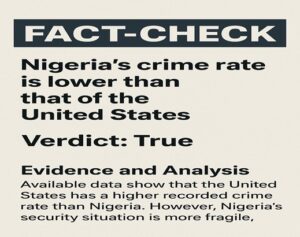Claim: Nigeria’s crime rate is lower than that of the United States. Verdict: True. Available data show that the United States has a higher recorded crime rate than Nigeria. However, Nigeria’s security situation is more fragile, with higher risks from insurgency, kidnapping, and armed conflict. Background Story A presidential aide, Daniel Bwala, recently claimed that
Claim: Nigeria’s crime rate is lower than that of the United States.
Verdict: True. Available data show that the United States has a higher recorded crime rate than Nigeria. However, Nigeria’s security situation is more fragile, with higher risks from insurgency, kidnapping, and armed conflict.
Background Story
A presidential aide, Daniel Bwala, recently claimed that Nigeria’s crime rate is lower than that of the United States. Bwala remarked during an interview with TrustTv while reacting to renewed debates over Nigeria’s human rights and security record. The controversy arose after certain U.S. lawmakers advocated for Nigeria to be placed on a blacklist due to allegations of genocide targeting Christians.
In a letter addressed to U.S. Secretary of State Marco Rubio, Congressman Riley Moore urged that Nigeria be redesignated as a ‘Country of Particular Concern’ (CPC) due to what he described as persistent attacks on Christians. Responding to these allegations, Bwala argued that Nigeria’s insecurity should be seen as a ‘situation’ rather than a ‘crisis,’ emphasising that the government inherited most of the challenges. He also insisted that insecurity is a universal problem, citing examples of violent crimes in other countries.
To reinforce his point, Bwala claimed that the crime rate in the United States is higher than that of Nigeria. This is a strong assertion that invites scrutiny, prompting NDR FactCheck to examine available data and determine whether the claim is true or false.
Verification: Understanding the Concept of Crime Rate
According to the Cambridge Dictionary, a crime rate refers to the number of crimes committed during a specific period of time. Crime rates are generally reported per 100,000 or 1,000 individuals and include categories such as violent crimes (e.g., murder, assault, robbery) and property crimes (e.g., theft, burglary). When making comparisons between countries, it is important to account for variations in data reporting and record-keeping practices.
Crime Data from the United States
The Federal Bureau of Investigation (FBI) reported in its 2023 Uniform Crime Report that the United States recorded an overall crime rate of about 47 crimes per 1,000 people. The Centers for Disease Control and Prevention (CDC) put the firearm-related homicide rate at around 7.5 per 100,000 people in the same year. Data from the Gun Violence Archive (2024) revealed that the U.S. experienced more than 600 mass shootings within a single year, resulting in about 40,000 gun-related deaths, including both suicides and homicides. These figures indicate that violent and firearm-related crimes are a significant challenge in the United States, despite its advanced policing and judicial systems.
Crime Data from Nigeria
By contrast, the United Nations Office on Drugs and Crime (UNODC) estimated Nigeria’s homicide rate at 6.0 per 100,000 people in 2022. Nigeria’s overall recorded crime rate is placed between 25 and 30 per 1,000 people—significantly lower than that of the U.S. Reports from the Nigeria Police Annual Report (2022) and the Nigeria Security Tracker published by the Council on Foreign Relations suggest that most incidents of insecurity in Nigeria—such as terrorism, banditry, and mass kidnappings—are concentrated in northern and central regions, rather than across the entire country.
Why the U.S. Appears to Have a Higher Rate
A contributing factor to the higher reported crime rates in the United States is its extensive and transparent data collection system. The mandatory national reporting requirements ensure that virtually all incidents are systematically recorded. The country’s high level of civilian gun ownership—over 390 million firearms—also contributes to frequent gun-related crimes. Moreover, urban safety issues such as random shootings, robberies, and hate crimes further elevate America’s per-capita crime statistics.
Why Nigeria’s Recorded Rate Appears Lower
Nigeria’s crime figures, on the other hand, are likely understated. Underreporting remains widespread due to weak policing, limited data infrastructure, and public distrust in law enforcement. Many crimes, especially in rural Nigeria, go unreported, while minor offences are often handled informally. Major security problems like terrorism and banditry are typically counted as conflict incidents, not criminal offences, and so are missing from standard crime statistics.
Conclusion
Current data indicate that the United States reports a higher recorded crime rate compared to Nigeria. The claim is, therefore, true. Nevertheless, Nigeria faces greater security challenges overall, particularly due to elevated risks associated with insurgency, kidnapping, and armed conflict in certain areas.
In summary, although Nigeria reports a lower crime rate than the United States based on available statistics, the extent and nature of insecurity can vary across different regions. As such, comparisons between crime rates should consider reporting practices and the diverse forms that insecurity may take.




















